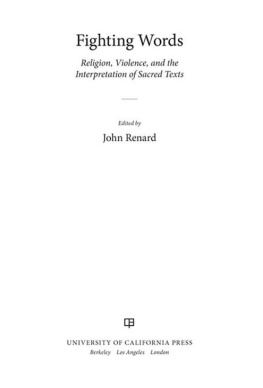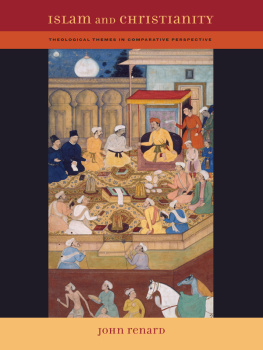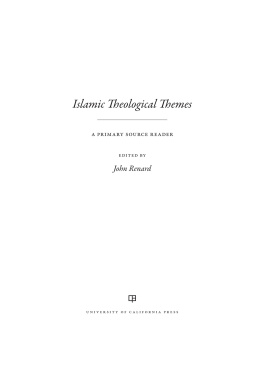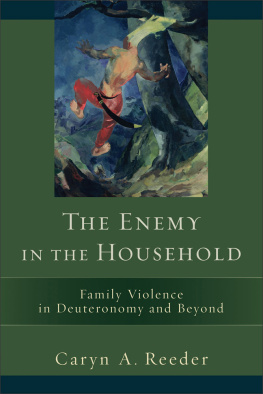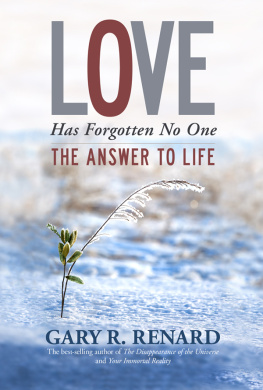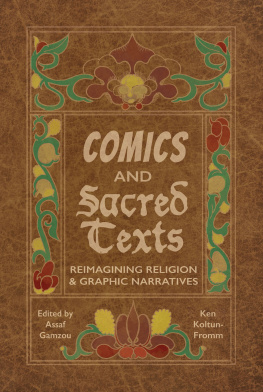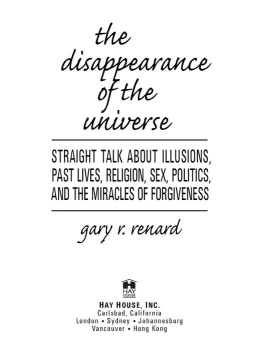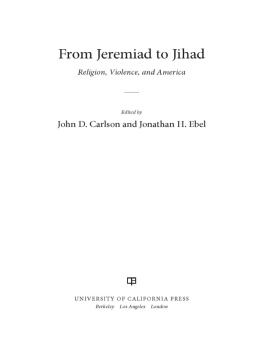Renard - Fighting words: religion, violence, and the interpretation of sacred texts
Here you can read online Renard - Fighting words: religion, violence, and the interpretation of sacred texts full text of the book (entire story) in english for free. Download pdf and epub, get meaning, cover and reviews about this ebook. City: Berkeley, year: 2012, publisher: University of California Press, genre: Religion. Description of the work, (preface) as well as reviews are available. Best literature library LitArk.com created for fans of good reading and offers a wide selection of genres:
Romance novel
Science fiction
Adventure
Detective
Science
History
Home and family
Prose
Art
Politics
Computer
Non-fiction
Religion
Business
Children
Humor
Choose a favorite category and find really read worthwhile books. Enjoy immersion in the world of imagination, feel the emotions of the characters or learn something new for yourself, make an fascinating discovery.
Fighting words: religion, violence, and the interpretation of sacred texts: summary, description and annotation
We offer to read an annotation, description, summary or preface (depends on what the author of the book "Fighting words: religion, violence, and the interpretation of sacred texts" wrote himself). If you haven't found the necessary information about the book — write in the comments, we will try to find it.
Renard: author's other books
Who wrote Fighting words: religion, violence, and the interpretation of sacred texts? Find out the surname, the name of the author of the book and a list of all author's works by series.
Fighting words: religion, violence, and the interpretation of sacred texts — read online for free the complete book (whole text) full work
Below is the text of the book, divided by pages. System saving the place of the last page read, allows you to conveniently read the book "Fighting words: religion, violence, and the interpretation of sacred texts" online for free, without having to search again every time where you left off. Put a bookmark, and you can go to the page where you finished reading at any time.
Font size:
Interval:
Bookmark:

Fighting Words
Fighting Words
Religion, Violence, and the
Interpretation of Sacred Texts
____
Edited by
John Renard

UNIVERSITY OF CALIFORNIA PRESS
Berkeley Los Angeles London
University of California Press, one of the most distinguished university presses in the United States, enriches lives around the world by advancing scholarship in the humanities, social sciences, and natural sciences. Its activities are supported by the UC Press Foundation and by philanthropic contributions from individuals and institutions. For more information, visit www.ucpress.edu.
University of California Press
Berkeley and Los Angeles, California
University of California Press, Ltd.
London, England
2012 by The Regents of the University of California
Library of Congress Cataloging-in-Publication Data
Fighting words : religion, violence, and the interpretation of sacred texts / edited by John Renard.
p. cm.
Includes bibliographical references and index.
ISBN 978-0-520-25831-0 (cloth : alk. paper) ISBN 978-0-520-27419-8 (pbk. : alk. paper) ISBN 978-0-520-95408-3 (ebook)
1. ViolenceReligious aspects. 2. Sacred booksHistory and criticism. 3. ReligionsRelations. I . Renard, John, 1944
BL 65. V 55 F 64 2012
201.76332dc232012029403
Manufactured in the United States of America
21 20 19 18 17 16 15 14 13 12
10 9 8 7 6 5 4 3 2 1
In keeping with a commitment to support environmentally responsible and sustainable printing practices, UC Press has printed this book on 50-pound Enterprise, a 30% post-consumer-waste, recycled, deinked fiber that is processed chlorine-free. It is acid-free and meets all ANSI / NISO (z 39.48) requirements.
CONTENTS
John Renard
Reuven Firestone
Bernhard A. Asen
Leo D. Lefebure
Michael A. Sells
Todd Lawson
Jamsheed K. Choksy
Laurie L. Patton
Pashaura Singh
PREFACE
My goal here has been to assemble a collection of essays designed to provide representative samples of an enormous subject: how various sacred texts deal with the subject of violence and how exegetical specialists in a variety of religious traditions have interpreted those texts. Given the libraries full of sacred texts and commentary thereon, such a vast topic as this one can only sample cursorily in a single volume. But the unfortunate topicality of questions of allegedly religious justification of carnage in our time makes all the more pressing the need to provide access to some explicit approach to the subject, however partial or fragmentary the results.
I offer my gratitude to the final cohort of colleagues who persevered through the vicissitudes of a process that began in 2006. I believe their generous and very patient collective effort will provide a useful contribution to broader understanding of a major religious theme in the lives and belief of so many millions of our fellow human beings.
I am grateful to Jared Goff and Alex Giltner, of Saint Louis University, for their valuable editorial assistance at various stages of the project; to Jacob Van Sickle, also of Saint Louis University, for his help in a variety of editorial matters, compiling the glossary, and generally preparing the final manuscript for delivery to the press, as well as for help in proofreading the final pages. I thank also Barbara Roos for compiling the index. Special thanks to Reed Malcolm, religious studies editor of the University of California Press, for his flexibility and patience in the completion of this project; and to UCP project editor Rose Vekony and copy editor Robert Demke for their very able editorial assistance in the books latter stages. And as always, my deepest gratitude to my spouse, Mary Pat, for her unfailing support and good humor through the ups and downs of this protracted project.
____
Exegesis and Violence
Texts, Contexts, and Hermeneutical Concerns
John Renard
Thomas Hobbes famously observed in his Leviathan that human life is nasty, brutish, and short. He and other influential philosophers have identified violence as virtually a state of nature that humankind has struggled endlessly to ameliorate, and with precious little success. Religious authors in every age and culture have likewise filled libraries with their analyses of the roots and remedies of this scourge, this mark of Cain. Every credible religious or ethical system condemns murder, yet sacred texts claimed by adherents of most (if not all) religious traditions describe in often grisly detail how believers have had recourse to divinely sanctioned violent means in defense of a people or to spread the sacred message. For millennia, preachers and teachers of religious values have discerned in their scriptures a divine logic both for and against engaging in large-scale violence, yet confusion among religious believers remains pervasive.
Many people across the globe find themselves asking whether religion is not in fact more of a catalyst than a cure for much of the violence in our world. Unfortunately, when the scale tilts toward blaming religion as a major (or even the chief) contributing cause of mayhem, the blame is too often ladled out exclusively against them. Religionists are too seldom willing to entertain the possibility that their own faith tradition is as much a contributor to the problem as a counterforce. Adherents of a given tradition often insist on how it could scarcely be more obvious that someone elses sacred text and historical record are rife with a divine mandate for the indiscriminate slaughter of unbelievers and all they hold dear, while claiming that their own revealed patrimony sanctions only self-defense. The present collection of essays invites readers to explore these vexing questions by mining the sacred texts and exegetical traditions for important examples of scriptured communities of faith.
BACKGROUND AND METHODOLOGICAL ISSUES
Comparative studies of the worlds religious traditions take countless different forms, depending on their guiding purpose. Many books survey the full range of aspects of multiple traditions, including sacred texts, basic beliefs and rituals, schools of thought or denominations, organizational features, and paradigmatic figures. Narrower in scope, a number of studies have dedicated themselves to a general comparison of the sacred texts of many traditions in a single volume. But general studies of the vast topics of scripture as a category or of violence as a theme seldom assist the reader in understanding the logic behind marshaling sacred texts in support of or against resorting to violent action, the widespread practice of de-contextualizing those texts in service of extremist interpretations, or the range of exegetical methods evidenced in the history of a given texts interpretation.
Why Exegesis and Violence?
One of the critical issues in interreligious relations today is the connection, both actual and perceived, between sacred sources and the justification of violent acts. Unfortunately the connection has been relatively little studied in a way that makes solid text-based scholarship accessible to the general public. The present volume begins with the premise that a balanced approach to religious pluralism in our world must build on a measured, well-informed response to the increasingly publicized and, sadly, sensationalized association of terrorism and other forms of largescale violence with religion.
Such a measured response must begin with the sacred texts so often cited as inspiration and justification for every kind of violence, from individual assassination to mass murder to the total obliteration of a society. In pursuing a balanced approach to this complex topic, this book is not merely about the religious sanction of violence. It is fundamentally about the diverse ways in which interpreters of the various sacred sources have handled texts that appear either to prescribe or to describe violence, including interpretations that militate against violence. The desired result is a representative overview of the virtually universal phenomenon of variant methods of interpreting sacred texts that sanction, mandate, or explicitly rule out violent means. Scripturally sanctioned [or forbidden] violence is clearly an expansive and ideologically loaded term. The present collection uses the category as a general organizing concept that embraces a wide range of scriptural traditions, exegetical methods, and hermeneutical concerns.
Next pageFont size:
Interval:
Bookmark:
Similar books «Fighting words: religion, violence, and the interpretation of sacred texts»
Look at similar books to Fighting words: religion, violence, and the interpretation of sacred texts. We have selected literature similar in name and meaning in the hope of providing readers with more options to find new, interesting, not yet read works.
Discussion, reviews of the book Fighting words: religion, violence, and the interpretation of sacred texts and just readers' own opinions. Leave your comments, write what you think about the work, its meaning or the main characters. Specify what exactly you liked and what you didn't like, and why you think so.

